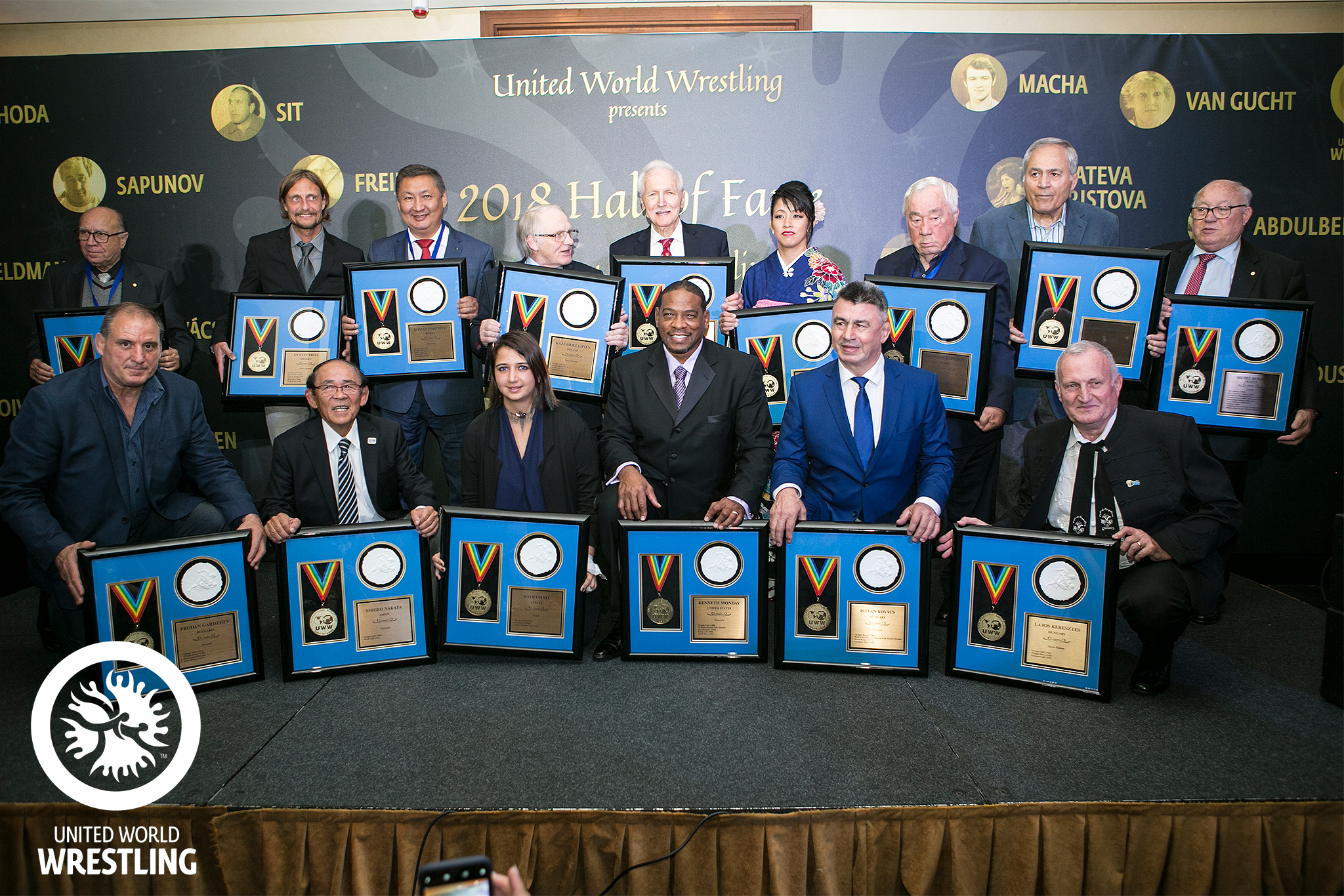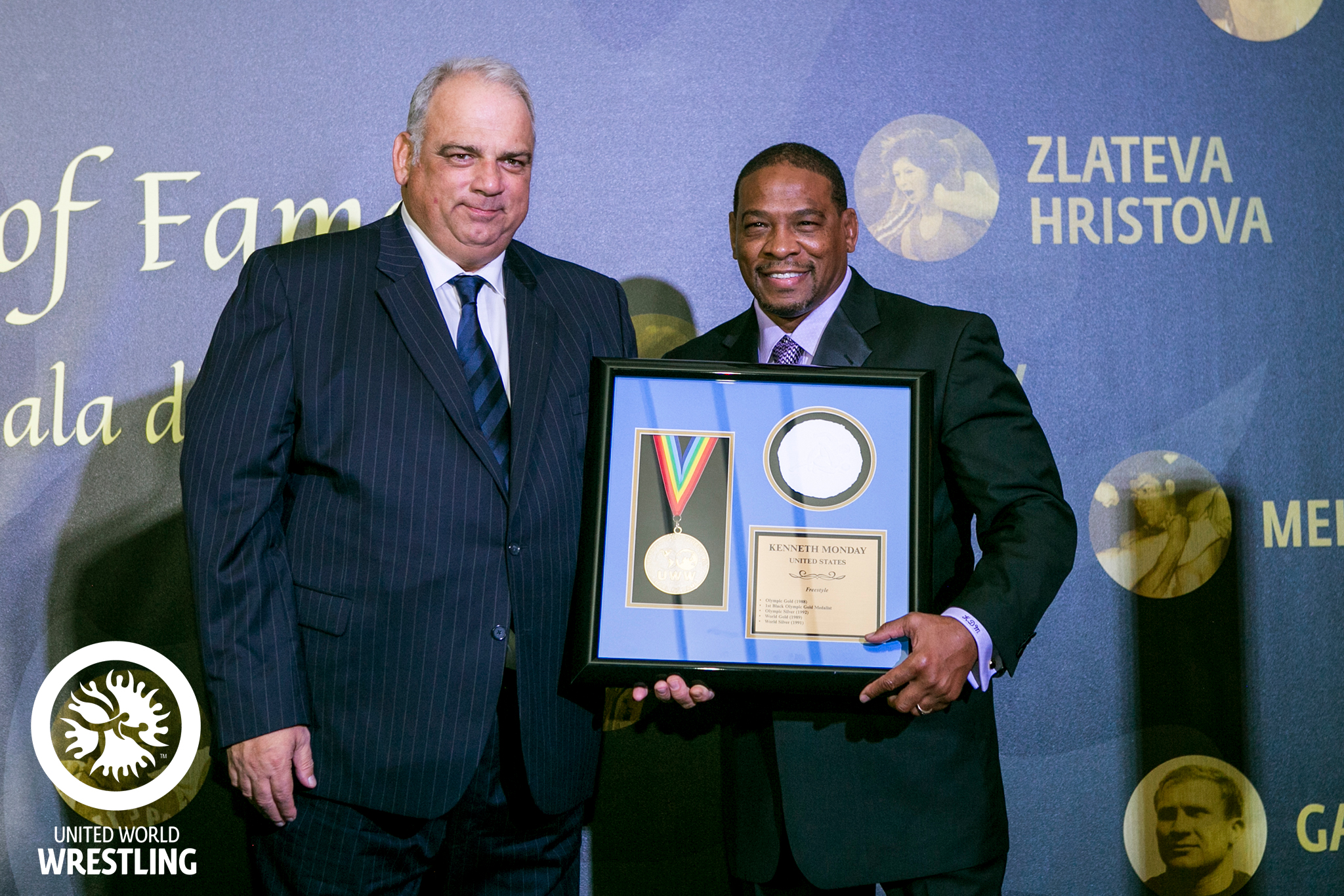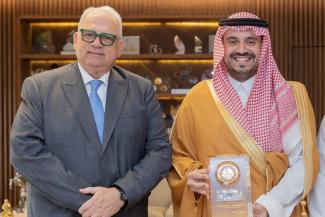Secretary General Michel Dusson Headlines Wrestling’s 2018 Hall of Fame Class
Saturday, October 20, 2018 - 15:32 By Tim Foley

BUDAPEST (October 20) – United World Wrestling Secretary General Michel DUSSON (FRA) has been inducted into the organization’s 2018 Hall of Fame Class. Dusson, along with two dozen other officials, athletes, and referees received their recognition Friday night at the Budapest Marriott on the eve of the 2018 Wrestling World Championships.
Dusson, whose career in wrestling has spanned sixty years (1958-2018), is a stalwart of the organization having served several presidents while as Secretary General and traveled the world to work on behalf of the sport.
“There are few words that can express the wrestling community’s gratitude to Michel,” said United World Wrestling president Nenad LALOVIC. “He has been a source of strength in the organization and has been a leader on our sport for more than half a century. The Hall of Fame award is in recognition of his unique contributions.”
Dusson has been a Bureau member since 1980 and Secretary General since 1982. Prior to becoming Secretary General, he was an international referee from 1958 to 1980, officiating the 1976 Olympic Games in Montreal. Dusson previously served as the president of the French Wrestling Federation and later as a CAS Arbitrator (1984-1992).
“Mr. Dusson has contributed so much to the sport it’s impossible to choose one thing, but he was responsible for initiating the recognition of women wrestling by the IF, which is a very fine legacy,” said bureau member and Hall of Fame Commission chairman Stan DZIEDZIC.
The night included inductees in several categories with careers spanning back to the 1940’s and with numerous Olympic and world championships to their names.
A full ist of entries can be found below, with photos available, here.

LEADER
Michel DUSSON (FRA) – Secretary General, United World Wrestling (1982-); Referee, (1958-1980)
Rolle Fernandez GUSTAVO (CUB) – National Team Coach, National Federation President, Bureau Member
REFEREE
Karri TOIVOLA (FIN) – Five Olympic Games, Every world championship 1990-2004; President United World Wrestling Referee Commission ’88-’14; Golden Whistle ‘95
COACH
Bayram SIT (TUR) Freestyle wrestler and coach for Turkish national team
Gannady SAPUNOV (RUS) Greco-Roman head coach from 1979-1990
ORDER OF MERIT
The Order of Merit is a new Hall of Fame category meant to honor those whose extraordinary service advanced the sport of wrestling. The first recipient was Dr. Harold TUNNEMAN (GER) who received the award at the 2016 Olympic Games in Rio de Janeiro.
Bernard J FELDMAN, M.D. (USA) Longtime doctor for United World Wrestling at numerous world championships and Olympic Games.
LEGEND
Sagalov ABDULBEKOV (RUS) -- First Olympic champion from the Russian Republic of Dagestan, one of the most prolific wrestling regions in the world. 2x world champion ‘71, ‘73 and ‘69 bronze medalist
WOMEN’S WRESTLING
Ayaka SHODA (JPN) -- 4x world champion
Stanka Zlateva HRISTOVA (BUL) -- 5x world champion 2x Olympic silver medalist
Silvia VAN GUCHT (FRA) -- 3x world champion
GRECO-ROMAN
Lajos KERESTZES (HUN) – Olympic champion, Olympic silver (posthumous)
Kazimierz LIPIEN (POL) Olympic champion1972; 2x world champion ‘73-‘74, 4x silver
Vitelav MACHA (CZE) Olympic champion 1972, Olympic silver ’76 2x World champion 74,77
Sergey MARTINOV (RUS) -- Four-time world champion, Olympic silver ‘92
Gustav FREIJ (SWE) – Olympic gold ’48, silver 1052, bronze ’60; world champion ’53, silver ’50 and bronze ’55 (posthumous)

Kenny Monday (USA) is a 1988 Olympic gold medalist and 1992 silver medalist (Photo: Gabor Martin)
FREESTYLE
Istvan KOVACS (HUN) – World champion 79, World bronze 77, Olympic bronze 80
Prodgan GARDZHEV (BUL) – Olympic Gold ‘64, bronze ’68; World Champion ‘63 ‘66, bronze 65
Roman DIMITRIEV (RUS) – Olympic gold ’72, silver ’76; World champion ‘763, Silver ’69, bronze ’70 & ’74 (posthumous)
Kenneth MONDAY (USA) – Gold ’88, Silver ’92; World champion ’89, ‘91
Shigeo NAKATA (JPN) – Olympic champion ’68, World champion ‘67
Monsoor MEHDIZADEH (IRI) – 3x world champion ’61,’62, ’65; Bronze ‘63


Share your thoughts.
Comments